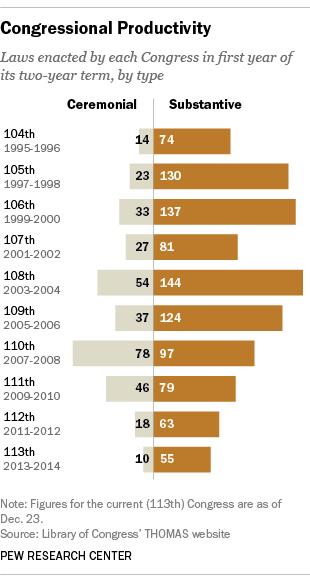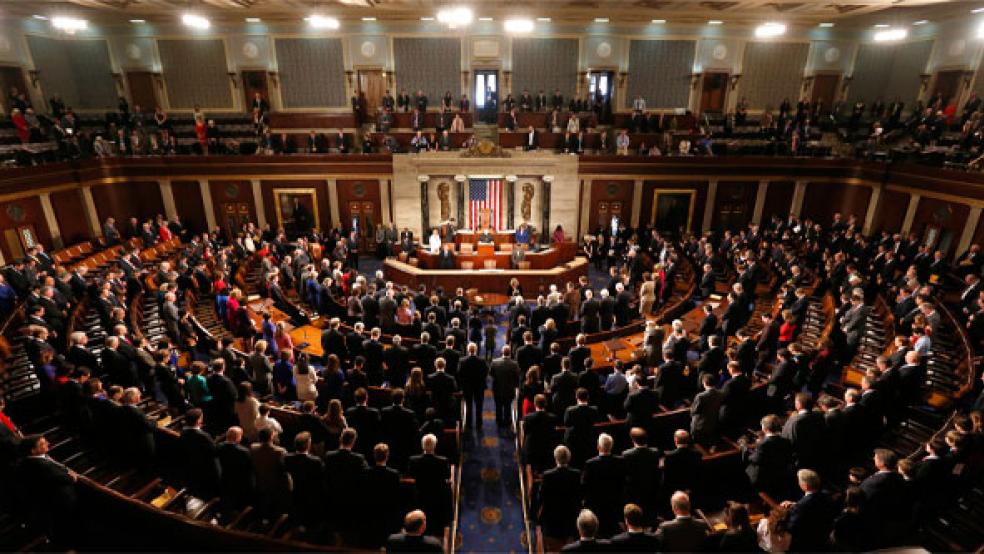The 113th Congress last year was arguably one of the least productive bodies in history. Lawmakers passed just 55 substantive bills that were signed into law, according to the Pew Research Center, while being bogged down in a partisan morass over scores of other important matters.
Moreover, the House was in session a total of 942 hours in 2013 (not counting brief pro-forma sessions), The New York Times calculated — “the fewest hours in a nonelection year since 2005, when detailed information about legislative activity became available.”
Related: 15 Awful Things More Popular Than Congress
Like a dysfunctional family writ large, the Republican-controlled House and Democratic-dominated Senate talked past each other on critical issues that included immigration reform, gun violence, food stamps and farm legislation, job training, trade and energy production.
Republicans and Democrats could agree on practically nothing of importance unless they were performing some constitutionally mandated step, like passing spending measures to fund the government or providing for the country’s defense. Even then, major differences of opinion over health care reform and spending levels triggered a 16-day government shutdown in October before the two sides finally agreed to negotiate a budget and spending package and new debt ceiling.
For the most part, it was a shameful performance, one that sent public approval of the institution to an all-time low of 9 percent in November. As veteran Sen. John McCain (R-AZ) sadly noted late last year, “The American people, very appropriately, have very little regard for us.”

Just how little did this “do-nothing Congress” actually do last year? A new CQ Roll Call legislative analysis of provides many answers. “The year on Capitol Hill was bracketed by fiscal crises resolved, if at all, only at the margins,” according to a summary of the analysis written by John Cranford. “It was characterized more by thwarted ambitions and unfulfilled promises than any measure of success.”
Related: Congressional Odd Couple Finally Strikes a Budget Deal
“The degree to which the 113th Congress has already been libeled by broad swaths of the press and public as the ‘worst ever’ speaks to the disappointment of missed opportunities, too-high expectations and business pretty much as usual,” according to the report.
Paul Ryan’s New Idea is Really Smart—But Will It Fly?
Even the deals reached were generally small-bore. In his State of the Union address in February 2013, President Obama called on Congress to overhaul immigration laws and address gun violence. Lawmakers did neither.
“Instead, they battled and postured and wound up incapable of enacting even a stopgap spending bill to keep the government in business after the fiscal year rolled over on Oct. 1,” the CQ Roll Call analysis notes. “The result was a 16-day shutdown of those agencies dependent on annual appropriations, increased disaffection by the public and further recriminations on Capitol Hill.”
In fairness, lawmakers tallied a small handful of legislation accomplishments:
- Reauthorization and expansion of the Violence Against Women Act
- An overhaul of the student loan program that shifted Stafford undergraduate loans from a fixed interest rate to a variable interest rate
- Enactment of new rules governing compounding pharmacies and tracking pharmaceuticals after the 2012 fungal meningitis outbreak in New England
- Approval of $60.2 billion in assistance to victims of Superstorm Sandy in New Jersey and other northeastern states
- Two so-called “doc fixes” to protect doctors against scheduled sharp reductions in Medicare reimbursements
Related: Details of the Senate Fiscal Cliff Tax Deal
With the threat of a financial crisis hanging over them, the House and Senate also began the year with a last-minute deal to avert a “fiscal cliff” of massive tax increases and spending cuts. That agreement, approved New Year’s Day before the new Congress was even sworn in, made permanent most of the Bush era tax cuts, while allowing tax increases for some upper income individuals and families.
Still, the list of missed opportunities or intractable issues overshadowed these few accomplishments:
- Major farm and food stamp legislation languished in the two chambers and was kicked down the road.
- A bipartisan proposal to extend national background checks to include people who purchase weapons at gun shows died in the Senate and had no chance of House passage.
- Proposals for expanded mental health treatment to help prevent gun violence among young people went nowhere.
- Negotiations over sweeping trade legislation foundered.
- The House and Senate couldn’t agree on reauthorizing the No Child Left Behind law.
- Obama’s minimum wage increase proposal was tabled.
- A workplace discrimination law to protect gays, lesbians and bisexuals passed the Senate but wasn’t brought up in the House.
- Legislation to overhaul and consolidate 47 federally administered job-training programs was pushed to the following year.
- Welfare-to-work waivers to give governors more flexibility in helping the unemployed find new jobs stalled.
- The House and Senate clashed over offshore drilling policies.
- House Republicans repeatedly voted to repeal or derail the Affordable Care Act in the face of unyielding opposition from the Senate and the president.
- Republicans and Democrats battled over constructing the Keystone XL pipeline, with the House attempting to force approval by stripping the president of authority over the granting of permits.
And on and on it went.
The CQ Roll Call analysis said, “Perhaps the two most significant actions of the first session of the 113th Congress were reactions to the persistent partisanship and ideological polarization that has dominated the legislative branch for more than two decades.”
One was the late-December budget agreement to raise discretionary spending caps for fiscal 2014 and 2015. Hailed as a bipartisan breakthrough by its authors, the deal accomplished neither the revenue gains sought by the Democrats nor the entitlement constraints sought by Republicans.
The other was the unilateral action by Senate Democrats led by Majority Leader Harry Reid of Nevada when Reid pulled the trigger on the nuclear option to do away with the filibuster and the right of the minority party to block numerous Obama appointees to federal offices and judgeships. “The result may be a further deterioration of comity in the Senate — even if the president can count on the majority to more readily get nominees confirmed,” the analysis stated.
Top Read from The Fiscal Times:





